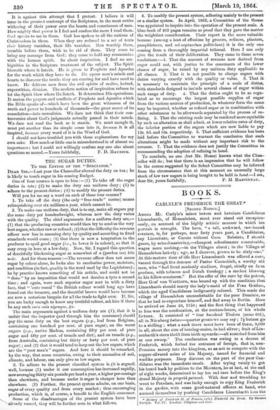THE SUGAR DUTIES.
To THE EDITOR OF THE " SPECTATOR."
DEAR Sin,—Last year the Chancellor altered the duty on tea ; he is likely to touch sugar in his coming Budget.
One of four courses is open to him :— (1) To take off the sugar duties in tote; (2) to make the duty one uniform duty ; (3) to adhere to the present duties ; (4) to modify the present duties.
Will you let me say a word on each of these four courses?
1. To take off the duty (the only "free-trade" course) means relinquishing over six millions a year, which cannot be.
2. To make one uniform duty, that is to say, make all sugars pay the same duty per hundredweight, whereas now the duty varies with the quality. The chief arguments for a uniform duty are,— (1) that the producing countries would then try to send us the very best sugars, whether raw or refined; (2) that the difficulty the revenue officer now has in assessing duty by quality and according to fixed standards would cease ; (3) that there is now a temptation to the producer to spoil good sugar (i.e., to lower it in colour), so that it may creep in here at a low duty. Now, Sir, I regard this question of deceitfully blackening sugar as somewhat of a (pardon me) bite noir. And for these reasons :—The revenue officer does not assess sugar by colour alone, he looks also to saccharine power, moisture, and condition (in fact, quality is the word used by the Legislature) ; he by practice knows something of his article, and could not be " done" by an imposition that would not deceive a tyro a second time ; and again, were such superior sugar sent in with a dirty face, that "'cute rascal " the British refiner would long ago have found out the treasure, and the deceitful brown would have become ere now a notorious bargain for all the trade to fight over. If, Sir, you are lucky enough to know any truthful refiner, ask him if there be any such rare avis nigroque, The main arguments against a uniform duty are (1), that it is unfair that the importer (and through him the consumer) should pay the same duty on the best sugars (e.g., loaf from Belgium, containing one hundred per cent. of pure sugar), on the worst sugars (e.g., native Madras, containing fifty per cent. of pure sugar and fifty per cent. of treacle and dirt), and on treacle (e.g., from Australia, containing but thirty or forty per cent. of pure sugar) ; and (2) that it would tend to keep out the low sugars, which are the "poor man's" sugars. And here it should be remarked, by the way, that some countries, owing to their anomalies of soil, climate, and labour, can only give us low sugars.
3. To adhere to the present classified system is (it is argued) well, because (1) under it our consumption has increased rapidly, nowaveraging thirty-six pounds per head a year, a higher per-tentage than elsewhere, and because under it sugar is cheaper here than elsewhere. (2) Further, the present system admits, on one basis, sugar of every quality and from every market ; thus encouraging production, which is, of course, a benefit to the English consumer.
Some of the disadvantages of the present system have been eady named, they will be further seen in what follows. 4. To modify the present system, adhering mainly to the present or a similar system. In April, 1862, a Committee of the House was appointed to inquire into the operation of the present scale. A blue-book of 403 pages remains as proof that they gave the matter the weightiest consideration. Their report is the more valuable because (among a host of effusions by grocers, refiners, planters, pamphleteers, and ad-captandum politicians) it is the only one coming from a thoroughly impartial tribunal. Here I can only give the result of their deliberation. They came to these seven resolutions :-1. That the amount of revenue now derived from sugar could not, with justice to the consumers of the lower classes of sugar, be raised by any uniform duty applicable to all classes. 2. That it is not possible to charge sugars with duties varying exactly with the quality or value. 3. That it is necessary to maintain the principle of a scale of duties, with standards designed to include several classes of sugar within each range of duty. 4. That the duties ought to be so regu- lated as to encourage the largest possible supplies of sugar from the various sources of production, in whatever form the same may be imported, whether as refined sugar or in combination with other substances to be afterwards separated by the process of re- fining. 5. That the existing scale may be rendered more equitable by such an alteration as shall admit, at lower relative rates of duty, the inferior portion of the sugars which are now liable to pay 12s. 8d. and I 6s. respectively. 6. That sufficient evidence has been laid before the Committee to warrant the conclusion that such alterations might be made without any important risk to the revenue. 7. That the evidence does not justify the Committee in recommending the adoption of refining in bond.
To conclude, no one (but Mr. Home) knows what the Chan- cellor will do ; but that there is an impression that he will follow in the course suggested by the Select Committee may be inferred from the circumstance that at this moment an unusually large stock of low raw sugars is being bought to be held in bond.—I am,


































 Previous page
Previous page